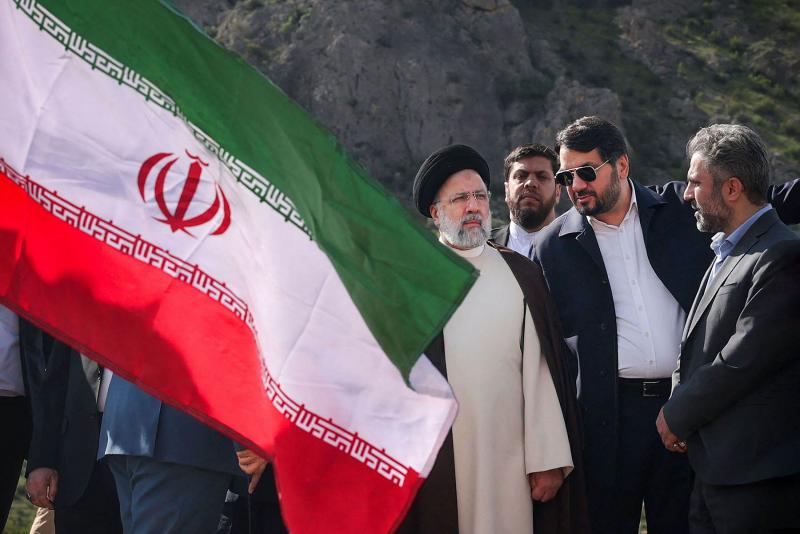TEHRAN
Iranian President Ebrahim Raisi, a hardliner long seen as a potential successor to Supreme Leader Ayatollah Ali Khamenei, was killed in a helicopter crash in mountainous terrain near the Azerbaijan border, officials and state media said on Monday.
His death ushers in a new era of uncertainties amid growing tensions for Iran, both at home and abroad.
The charred wreckage of the helicopter which crashed on Sunday carrying Raisi and Foreign Minister Hossein Amir-Abdollahian was found early on Monday after an overnight search in blizzard conditions.
Raisi’s death was confirmed in a statement by Vice-President Mohsen Mansouri and on state television.
State TV reported that images from the site showed the aircraft slammed into a mountain peak, although there was no official word on the cause of the crash.
State news agency IRNA said Raisi was flying in a US-made Bell 212 helicopter.
The ten-hour search for the wreckage showed Iran’s limited ability to manage a major national security emergency. Tehran has sought Turkish and Russian help in locating the missing plane. Mystery still envelopes some of the circumstances of the crash as two other helicopters carrying other offcials landed safely despite the bad weather.
Israel tried to dispel speculations it could have been involved. “It wasn’t us,” an Israeli official, who requested anonymity, told Reuters Monday.
Amir-Abdollahian, who was killed along with Raisi, was seen as a hard-liner close to the country’s paramilitary Revolutionary Guard. He confronted the West while also overseeing indirect talks with the US over the country’s nuclear programme and rapprochement with Arab Gulf nations.
Raisi, 63, was elected president in 2021, and since taking office has ordered the tightening of repressive morality laws, overseen a bloody crackdown on anti-government protests and pushed hard in nuclear talks with world powers.
Iranian Supreme Leader Ayatollah Ali Khamenei, who holds ultimate power with a final say on foreign policy and Iran’s nuclear programme, had earlier sought to reassure Iranians, saying there would be no disruption to state affairs.
Rescue teams fought blizzards and difficult terrain through the night to reach the wreckage in the early hours of Monday.
Raisi had been at the Azerbaijani border on Sunday to inaugurate the Qiz-Qalasi Dam, a joint project. Azerbaijan’s President Ilham Aliyev, who said he had bid a “friendly farewell” to Raisi earlier in the day, offered assistance in the rescue.
“With the discovery of the crash site, no signs of life have been detected among the helicopter’s passengers,” the head of Iran’s Red Crescent, Pirhossein Kolivand, told state TV.
Earlier, the national broadcaster had stopped all regular programming to show prayers being held for Raisi across the country.
Video showed a rescue team, wearing bright jackets and head torches, huddled around a GPS device as they searched a pitch-black mountainside on foot in a blizzard.
Mohammad Mokhber, 68, Iran’s first vice-president, became interim president on the death of Raisi.
Mokhber is part of a three-person council, along with the speaker of parliament and the head of the judiciary, that will organise a new presidential election within 50 days of the president’s death.
Like Raisi, he is seen as close to Supreme Leader Ali Khamenei.
Mokhber had previously been head of Setad, an investment fund linked to the supreme leader.
The crash comes at a time of growing dissent within Iran over an array of political, social and economic crises.
Iran has faced years of mass protests against its Shia theocracy over its ailing economy, lack of freedoms and women’s rights, making the moment that much more sensitive for Tehran and the future of the country.
Iran’s clerical rulers also face international pressure over Tehran’s disputed nuclear programme and its deepening military ties with Russia during the war in Ukraine.
Iran has been involved in proxy-attacks aimed at supporting Hamas in its war against Israel. Tehran spent decades supporting armed groups in Lebanon, Syria, Iraq, Yemen and the Palestinian territories that allow it to project power in the region.
Since Iran’s ally Hamas attacked Israel on October 7, provoking Israel’s bloody assault on Gaza, conflagrations involving Iran-aligned groups have erupted throughout the Middle East.
In Iran’s dual political system, split between the clerical establishment and the government, it is Raisi’s 85-year-old mentor Khamenei, supreme leader since 1989, who holds decision-making power on all major policies.
For years many have seen Raisi as a strong contender to succeed Khamenei, who has endorsed Raisi’s main policies.
With Raisi’s death, the only other person so far suggested to succeed the supreme leader has been Mojtaba Khameini, the 55-year-old son to Khamenei.


